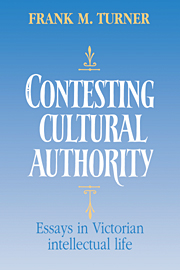Book contents
- Frontmatter
- Contents
- Preface
- I SHIFTING BOUNDARIES
- 1 The religious and the secular in Victorian Britain
- 2 Cultural apostasy and the foundations of Victorian intellectual life
- 3 The crisis of faith and the faith that was lost
- 4 The secularization of the social vision of British natural theology
- II SCIENCE AND THE WIDER CULTURE
- III MODERNS AND ANCIENTS
- Index
4 - The secularization of the social vision of British natural theology
Published online by Cambridge University Press: 22 September 2009
- Frontmatter
- Contents
- Preface
- I SHIFTING BOUNDARIES
- 1 The religious and the secular in Victorian Britain
- 2 Cultural apostasy and the foundations of Victorian intellectual life
- 3 The crisis of faith and the faith that was lost
- 4 The secularization of the social vision of British natural theology
- II SCIENCE AND THE WIDER CULTURE
- III MODERNS AND ANCIENTS
- Index
Summary
The classical age of British natural theology extended from its rise in the middle of the seventeenth century through its general, though not complete, demise toward the close of the nineteenth. Scientific workers and their supporters in the seventeenth century had originally appealed to natural theology to assure potential critics that science or natural philosophy implied a religious and eternal rather than a secular or time-limited frame of reference. Simultaneously, natural theologians had also located inside this framework of eternal values and providential purposes the society within which that early science flourished. The secularization of British science – that is, the establishment of science within the saeculum or within history rather than within eternity – required the separation of both the subject matter of science and its social venue from reference to the eternal and providential backdrop provided for two centuries by natural theology. The first of those separations has received much historical analysis. The second separation whereby scientists and scientific publicists ceased to use religious values in general and natural theology in particular to provide a moral justification or theodicy for the kind of society to which British science contributed and from which it received support has received very little attention. It may very well be that only as a secular or temporal theodicy replaced the religiously grounded social vision associated with traditional natural theology could scientists pursue the investigation of nature without reference to the divine.
- Type
- Chapter
- Information
- Contesting Cultural AuthorityEssays in Victorian Intellectual Life, pp. 101 - 128Publisher: Cambridge University PressPrint publication year: 1993
- 4
- Cited by

